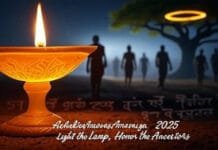INVC NEWS
New Delhi : Can auspicious work be done during Pitru Paksha? Discover the religious basis, special worship rituals, and scientific perspectives on conducting important events during this period.
Pitru Paksha is a period in the Hindu calendar dedicated to the remembrance and honoring of ancestors. Traditionally, it is considered a time for performing rituals to appease and pay respects to deceased ancestors, rather than for conducting auspicious activities like weddings, housewarmings, or other celebrations. This belief is rooted in the idea that during Pitru Paksha, the focus should be on fulfilling one’s duties towards the ancestors, and any other joyous or auspicious event might be seen as disrespectful or as diverting attention from these duties.
Religious Basis for Avoiding Auspicious Work
The religious basis for avoiding auspicious work during Pitru Paksha is grounded in the belief that this period is dedicated to the Pitrs (ancestors), who are believed to visit the earth to receive offerings from their descendants. It is said that during these days, performing rituals like Shraddha and Tarpan (offering of water and prayers) is crucial for ensuring the peace of the departed souls. Engaging in auspicious activities during this period might be seen as neglecting these important duties, potentially leading to the displeasure of the ancestors.
However, there is flexibility within these traditions. If an urgent or unavoidable auspicious event must be conducted during Pitru Paksha, there are prescribed rituals to seek the blessings of the ancestors. These rituals generally involve special prayers, offerings, and seeking forgiveness for conducting such activities during this period.
Special Worship Tradition for Conducting Auspicious Work
If someone must conduct an auspicious event during Pitru Paksha, the tradition involves performing specific rituals to appease the ancestors and seek their blessings. This typically includes:
- Shraddha and Tarpan: Performing these rituals is essential before engaging in any other auspicious work. Shraddha involves offerings of food, water, and prayers to the ancestors, while Tarpan is a water offering accompanied by specific mantras.
- Apology and Blessings: During the ritual, one seeks forgiveness from the ancestors for conducting an auspicious event during Pitru Paksha and prays for their blessings. This is often done with sincerity and devotion, as it is believed that the ancestors’ blessings are crucial for the success and smoothness of any auspicious work.
- Avoidance of the Specific Tithi: Some scriptures suggest that only the Tithi (day) dedicated to one’s ancestors should be avoided for auspicious activities. The other days of Pitru Paksha may be less restrictive, especially if necessary rituals have been performed.
Scientific and Psychological Basis
From a scientific and psychological perspective, the rituals and traditions associated with Pitru Paksha can provide a sense of emotional and mental balance. The act of remembering and honoring ancestors can offer psychological benefits, such as:
- Emotional Catharsis: Engaging in rituals provides a structured way to express grief and gratitude, offering emotional release and peace.
- Family Bonding: The rituals often involve the participation of the entire family, reinforcing family bonds and providing collective emotional support.
- Mental Peace and Positive Energy: The sense of fulfillment and peace that comes from performing these rituals can generate positive energy, which can be beneficial when undertaking any significant work.
In summary, while traditionally, Pitru Paksha is not considered an ideal time for auspicious activities, there is provision within the traditions to perform such work if necessary, provided that appropriate rituals and respects are paid to the ancestors. The combination of religious observance and psychological benefits can ensure that the work proceeds smoothly, with the blessings of the ancestors.
















